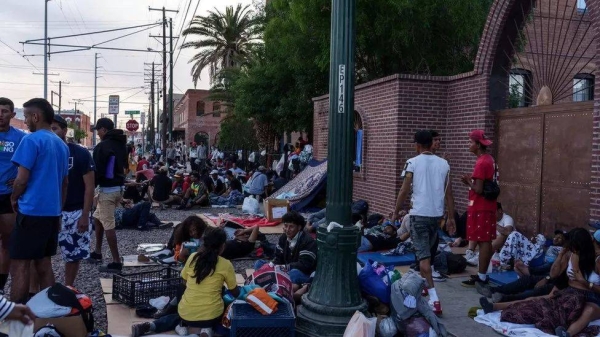
Deep in the mountains of Hsinchu county in north Taiwan, a few dozen residents of Smangus are holding their daily morning meeting in a weatherboard hut, overlooking the towering peaks nearby.
The remote Indigenous village, home to about 200 Atayal people, is preparing for Saturday’s presidential election. They take it very seriously, running their own polling station since 2008, and discussing candidates with all the residents.
“We normally don’t talk about politics [at the meeting] but the presidential election is a big deal,” says Lahuy Icyeh, a community leader. “The village elders encourage the tribe to choose who is best for Taiwan.”
The vote will be Taiwan’s eighth direct presidential election since martial law ended in the late 1980s. The current president, Tsai Ing-wen, must step down due to term limits, and her current deputy, Lai Ching-te, is running to keep the Democratic Progressive party (DPP) in power. He’s up against Hou Yo-ih of the national opposition Kuomintang (KMT), which ruled during the decades of authoritarianism, and the Taiwan People’s party (TPP), led by founder Ko Wen-je.
The campaign has been dominated by the Chinese Communist party’s threat to annex Taiwan, but surveys have shown it is economic issues that are the main concern of voters, including low wages, housing affordability, energy security and inflation. In 2022, wages had the steepest yearly decline in 10 years, while housing in some Taiwanese cities ranks among the world’s most expensive relative to income.
Inflation was lower than many other countries in 2023 – 2.48% – but a series of extreme price rises on individual products such as eggs worsened perception of the cost of living.. There are also Care for children and the elderly, corruption, judicial reform, education and rights for minorities are also immediate concerns.
All three presidential candidates have made pledges addressing most big-ticket items but many of them are quite similar.Dafydd Fell, director of the Centre of Taiwan Studies at Soas University of London, says this has neutralised most debates except on the contentious future of Taiwan’s nuclear power plants. Publication of polling – which could show any potential impact of these pledges – is banned in the 10-day blackout period prior to the vote.
The Smangus community has clear asks: better assistance for elderly care, road improvements, and land rights and transitional justice for Indigenous tribes. But the village, which operates a kibbutz-style economy, including shared land and housing, and a flat-salary jobshare system, is protected from some of the economic issues.
For them, the presidential election is about big picture themes, says Yarah Pihu, Smangus’s Presbyterian minister and a community leader. “We want a president with an international perspective and a sense of Taiwanese identity.”
Masay Sulung a Smangus community leader, said: “I expect 90% of Smangus to vote for Lai Ching-te. We have high expectations for Lai, he has a clear vision for the country.”
At a DPP rally in Taipei, 20-year-old university students surnamed Huang and Chen say they supports the DPP’s stance on gender issues, Taiwanese identity, and care for the elderly. But there are signs that young people – who make up about 16% of the voting public – are moving away from the DPP, which is now seen by them as the establishment.
At a KMT rally, a 34-year-old man surnamed Liu says he’s switching from the DPP because he thinks governments should change frequently. In Guanxi township, Hsinchu province, one woman surnamed Lee, feels the same, but she doesn’t like Hou or Ko, so she’s just not going to vote.
Corruption is another major issue for most Taiwanese voters. Fell says political corruption is often the “most stressed issue in Taiwanese elections and has been the most influential issue in a number of local and national elections”.
“After eight years in office, you would expect the DPP to be threatened by this issue, and the KMT has made a number of accusations. But it is not entirely clear which side owns this issue.”
Candidates have flung a dizzying range of accusations at each other, from plagiarism to illegal housing structures, dodgy income streams, and other forms of corruption. Past local elections have seen allegations of vote-buying, bribery, voter intimidation and political links with organised crime.
“Taiwan’s local politics has been long dominated by ‘electoral machines’ - a system of voter mobilisation through networks of patronage and local political factions – ever since the authoritarian era,” says Kevin Luo, assistant professor in the Department of Political Science at the University of Minnesota. “The entrenchment of the KMT party machine in Miaoli is a good example.”
According to the Taiwan Anti-Corruption and Whistleblower Protection Association, 11.6% of 1,677 city councillor candidates in 2022 had criminal records – more than 20% of them in the county of Miaoli, New Bloom Magazine reported.
On a Friday night, independent candidate Tseng Wen-hsueh is rallying a crowd of people at a temple in Miaoli county on Taiwan’s west coast, on a platform of anti-corruption and political change. Party loyalty runs deep here among a diverse mix of ethnic groups and a high proportion of state-run employers in its large natural resources sector. In 72 years, Miaoli has never voted against the KMT, regardless of national trends. A popular joke refers to it as “Miaoli Nation”.
“Miaoli’s closed political environment allows those in power to do whatever they want,” Tseng tells the Observer. Most people struggle to imagine change after so long without it, he says. “So most of the people tend to continue to choose KMT for the sake of stability in their own lives.
“[But] if someone wins for the first time, the public will have confidence when they vote, this is the most important thing. The public will understand that this vote in hand can really bring about changes.”
Once known as Taiwan’s most remote village, Smangus only got electricity in 1980, and a road to neighbouring villages in 1995. That road – a trail of switchback turns and fuel-sucking inclines, punctuated by the remnants of frequent landslides – is now busy with campaign trucks and candidate advertising.
But in Smangus the vote is largely decided. Since at least 2008, the village has voted for the DPP in almost direct inverse proportions to the pro-KMT region it sits in. But the main thing is that they will vote.
“We enjoyed democracy later than other places,” says Icyeh. “ It’s important to choose someone who can protect and lead Taiwan and appreciate our hard-won democracy.”












